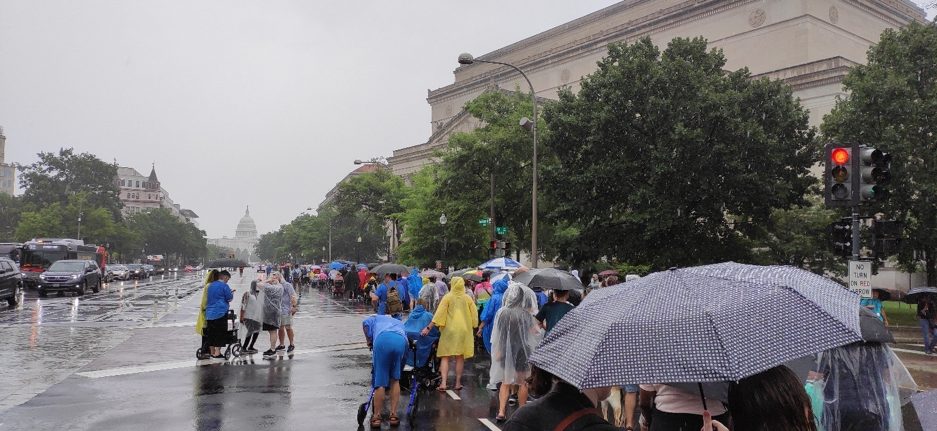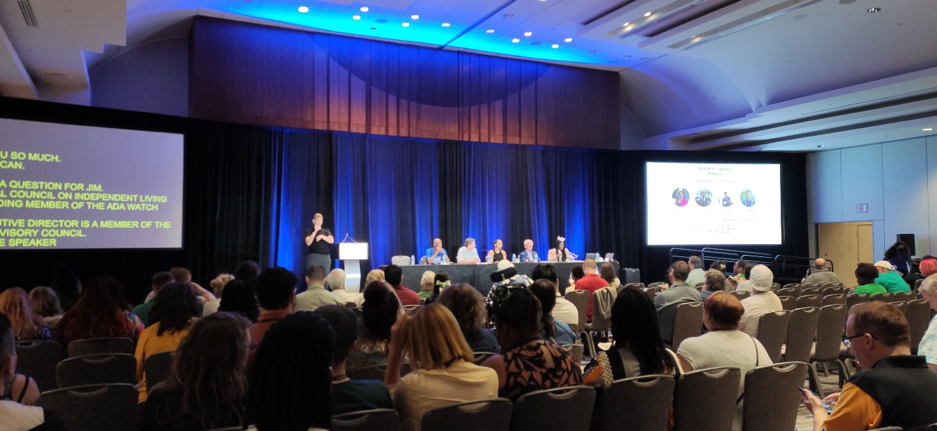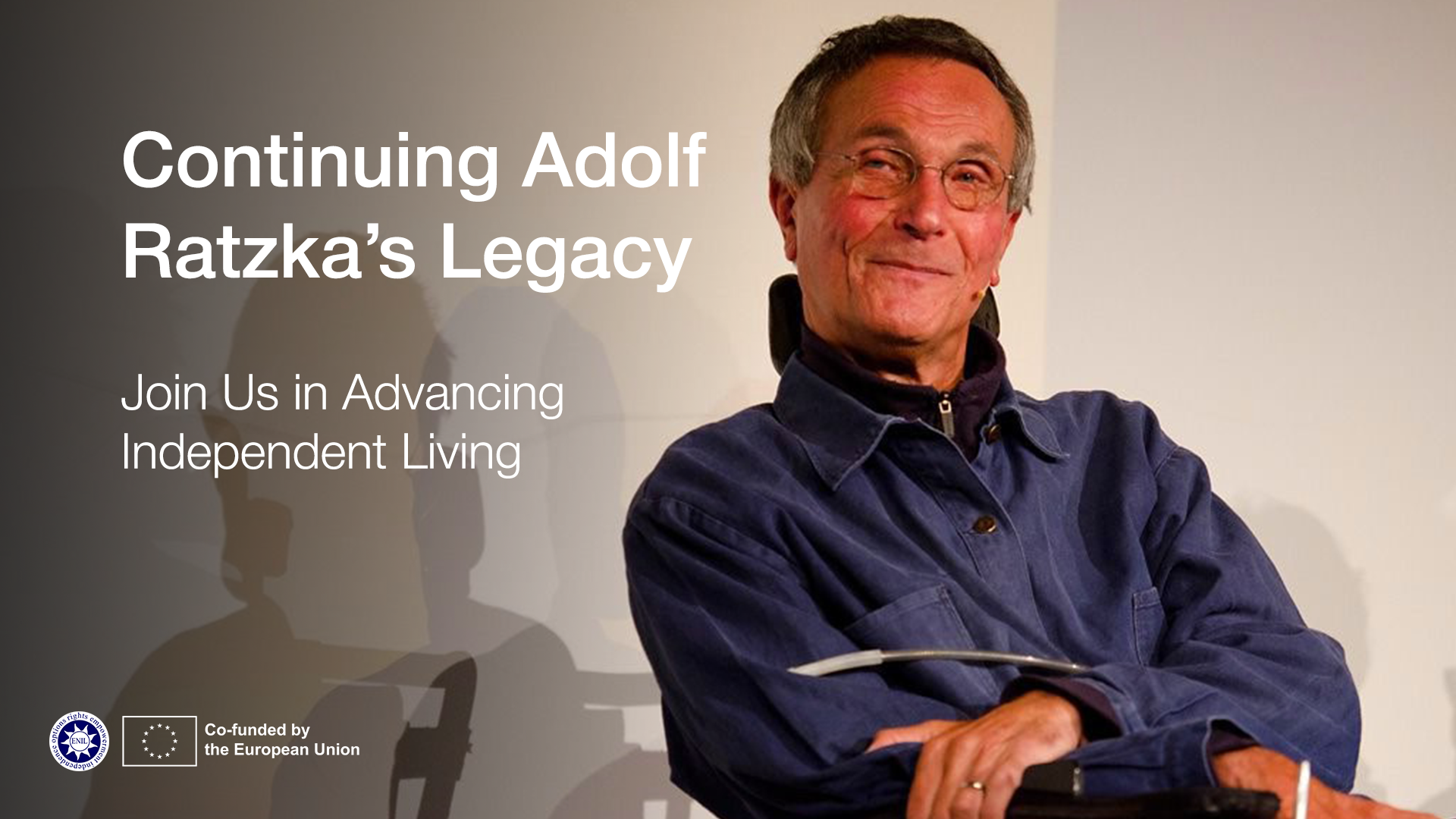Teodor Mladenov and Nadia Hadad
Washington DC, United States, July 2024
“What do we want? – Independence! – When do we want it? – Now!” This chant, familiar to Independent Living (IL) activists in Europe, was loud and clear during this year’s (soaking wet) IL march to the Capitol Hill in Washington DC, United States. Fittingly, people also chanted: “We’re here, we’re wet, our needs must be met!

Photo 1: The IL march to the US Capitol, organised by NCIL on 22 July
The event was organised by the National Council on Independent Living (NCIL), the umbrella organisation of the Centres for Independent Living in the United States, of which there are currently over 350. The march was part of the NCIL’s annual conference that took place between 22 and 25 July 2024 in Washington DC.
The theme of the 2024 conference was “Back to the Future”, which, besides playfully referencing the famous 1985 movie, reflected a desire to revisit the history of IL to find a better way forward. As stated in the conference booklet:
We learn from our history, both the good and the ugly. We reflect on the positive aspects to build upon and improve them. We reflect on the negative aspects to avoid those missteps and grow wiser.

Photo 2: A panel discussion during NCIL 2024 conference
The European Network on Independent Living (ENIL) was represented at NCIL’s 2024 conference by Nadia Hadad, co-chair of ENIL’s Board, and Teodor Mladenov, coordinator of ENIL’s IL Research Network. We convened a workshop on the “IL pillars” – an idea as old as the first Centre for Independent Living (CIL) that opened its doors in Berkeley, California, in 1972; and an idea that has been evolving ever since.
The IL pillars are the key supports and accommodations needed to make the IL of disabled people possible.
We started our workshop with a minute of silence to commemorate the great Adolf Ratzka. Adolf passed away on 21 July, leaving a huge gap in the IL movement and in the lives of the people who were close to him. He laid the pillars of IL in Europe – including personal assistance and peer support – by founding the Stockholm Cooperative on Independent Living (STIL) and the Independent Living Institute (ILI) in Sweden, as well as co-founding ENIL.
During the workshop, we looked at the history of the IL pillars from a global and intersectional lens – hence, revisiting the past in view of the future, which, for the IL movement, is markedly global and intersectional.
Building on the historically established pillars such as accessibility, transport, technical aids, housing, personal assistance, and peer support, we emphasised the need to also advocate for:
- access to supported decision-making;
- knowledge about IL history, philosophy, and organising;
- support for sexual and reproductive rights;
- access to internet and digital technology;
- access to legal aid;
- and support for transitions (to adulthood, higher education, employment, from parental home, and from institutional care).
These additional pillars, we argued, are necessary for disabled people’s IL in the 21st century. Our presentation can be downloaded by clicking on this link.
Our ideas were met with approval by the participants in our workshop – some 40 to 50 delegates out of over 200 in total (ours was just one of five concurrent workshops). The discussion after our presentation emphasised the need to also demand person-centred and person-led needs/eligibility assessments, as well as to enhance the support for IL in rural areas.
Beside conducting our workshop, we attended workshops on international collaboration for IL, the Convention on the Rights of Persons with Disabilities, disability-inclusive disaster management, and supported decision-making – all key priorities for the global IL movement. We were glad to learn that our ideas about updating the pillars of IL resonate with the general trends of global IL advocacy.
In the US, the movement currently focuses its advocacy efforts on increasing the public funding for CILs. To quote from the conference booklet again, CILs in the US:
have been underfunded for decades, leading to individuals with disabilities lacking access to critical services and support! Many areas in the U.S., especially in rural communities do not have access to a CIL. CILs need more funding in order to expand their service areas to address the unmet needs.
Funding issues notwithstanding, the positive vibes of the 1960s and 1970s were very much palpable throughout the conference. And despite going through a difficult period at home (including a lot of uncertainty and anxiety around the forthcoming US presidential election), our US hosts were also looking outwards at international collaboration.
Thus, at a networking event kindly hosted by Kirt Toombs, CEO of the Eastern Oregon Center for Independent Living, we met with the members of the World IL Network (WIN). WIN has been established in 2017 (including by ENIL) but is still in the early stages of its organisational development and institutional consolidation. Hopefully, this will happen soon as WIM is badly needed to make IL truly global.
Our experience at NCIL’s 2024 conference suggests that to go forward after learning from the good and the ugly of the past five decades of IL activism, we need to:
- secure public funding for national CILs and kindred IL organisations;
- develop supported decision-making systems to make IL possible for people with diverse mental capacities;
- develop international collaboration on IL to strengthen the movement globally, and particularly in the Global South countries;
- enhance IL advocacy in marginal communities and rural areas;
- and get disabled people involved in decision-making on the development of new technologies, including Artificial Intelligence (AI) systems.
We look forward to developing further these insights at ENIL’s 2024 Freedom Drive in September 2024. Hopefully, the weather in Brussels would be more sympathetic to the cause of IL than was Washington’s. But whatever the weather, Brussels IL activists will certainly remain as proud, strong and visible as their fellow freedom fighters in the US.



